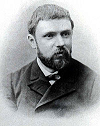

Henri Poincaré was born on April 28, 1854 in the city of Nancy in the Lorraine province of France, the son of a medical professor. Precocious in nearly every subject, he was educated at the Lyceée in Nancy, École Polytechnique, École des Mines, and finally at the University of Paris where he received the doctorate in mathematics in 1879. His teaching career included positions at the University of Caen, École Polytechnique, the University of Paris, and the Sorbonne.
Poincaré was a genius whose mathematical contributions were enormous. He worked in differential equations, complex analysis, number theory, abstract algebra, and topology. He also made important contributions to physics, particularly in celestial mechanics, relativity, and quantum theory. The Poincaré conjecture, concerning the classification of 3–dimensional manifolds, was one of the most important unsolved problems in mathematics, until the conjecture was proved by Grigori Perelman in a series of papers in 2002 and 2003.
The famous quote on set theory, evidently has been misattributed to Poincaré, and perhaps should be attributed to Ernst Hölder, the son of Otto Hölder, instead. Nonetheless, Poincaré did argue against the overly formal, axiomatic approach to mathematics, championed by Bretrand Russell and David Hilbert, and much in vogue in the early part of the twentieth century. Poincaré strongly believed that mathematical research must be a mixture of logic and intuition. For more on Poincaré's philosophy, read his article on The Future of Mathematics (1909).
Poincaré died on July 17, 1912 in Paris, at the age of 58.